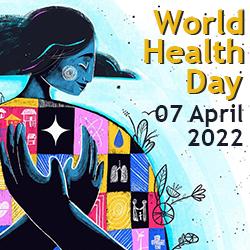World Health Day 2022
On World Health Day 2022, EFPA makes the link between our climate and our health, and looks forward to European Mental Health Week.
On World Health Day 2022, EFPA makes the link between our climate and our health, and looks forward to European Mental Health Week.
The state of the planet matters for people’s health across the lifespan and WHO links extreme heat, floods, and wildfires to serious health issues such as stroke, respiratory illness, and poisoning through to mental health impacts due to trauma[1].
Young people can be particularly impacted in terms of their mental health by worries about climate change. This comes as an extra burden, as and according to Eurofound’s research[2] the COVID-19 crisis already had a disproportionate impact on young people’s life satisfaction and mental well-being compared to older groups.
A survey of 10,000 children and young people across 10 counties including countries in Europe (Hickman et al 2021) showed worry about climate change across all countries with 59% very or extremely worried and 84% at least moderately worried[3].
Most children and young people even if they have not been directly impacted by climate change, have already watched, or heard about the details of these life-threatening events. The worry about the future is stronger for the youth group, because they are the ones who are going to live in a future substantially affected by climate change. Climate change can have an impact on adolescents particularly in terms of distress at witnessing the effects of climate change; being impacted by adverse events such as flood, fire etc that are climate related; or being in want of psychological help with the impact of climate change.

This need of young people is recognised in the move of the European Commission to declare 2022 the European Year of Youth[4], which the Commission intends will shine a light on the role of young people in creating a greener more inclusive and digital future.
Mental Health Europe are once again hosting European Mental Health Week, from 9 - 13 May[5]. The theme ‘Speak up for mental health’ is intended to shine the spotlight on youth mental health as a high-profile societal issue now and in the future.
This might be to address stigma for young people and make it OK to ask for help. It might be to promote your service to young people in your community. It might be working with health authorities to improve access to and enhance funding for mental health services especially early intervention for young people in your area. It might be supporting schools to educate about climate change. It might be supporting communities and local authorities to come together to tackle climate change. It might be working through agencies such as the Red Cross in your country to support people who are refugees from war in Ukraine.
European Mental Health Week is an ideal springboard for the wider campaign for a European Year of Mental Health.
Christoph Steinebach, EFPA President said:
“On World Health Day, when this year WHO focuses attention across the world on urgent actions needed to keep humans and the planet healthy and foster a focus on well-being, EFPA calls on every one of the over 300,000 psychologists across Europe to play our small part in supporting the health and wellbeing of people and our planet”.
The WHO toolkit on climate and health can be found here https://www.who.int/campaigns/world-health-day/2022/campaign-toolkit
The MHE toolkit on #Speak up for mental health will shortly be available here https://www.mhe-sme.org/emhw/
[1] https://www.who.int/campaigns/world-health-day/2022
[2] Eurofound (2021), Impact of COVID-19 on young people in the EU, Publications Office of the European Union, Luxembourg. https://www.eurofound.europa.eu/publications/report/2021/impact-of-covid-19-on-young-people-in-the-eu
[3] Hickman, Caroline et al. Climate anxiety in children and young people and their beliefs about government responses to climate change: a global survey. The Lancet Planetary Health, Volume 5, Issue 12, e863 - e873 DOI:https://doi.org/10.1016/S2542-5196(21)00278-3
[4] https://europa.eu/youth/year-of-youth_en#content
[5] https://www.mhe-sme.org/emhw/
EFPA’s Expert Reference Group on psychology and climate change contributed their expertise to this statement.
The Group comprises representatives from across Europe working together on developing the evidence base of psychology related to climate change, and translating it into practical implementation.